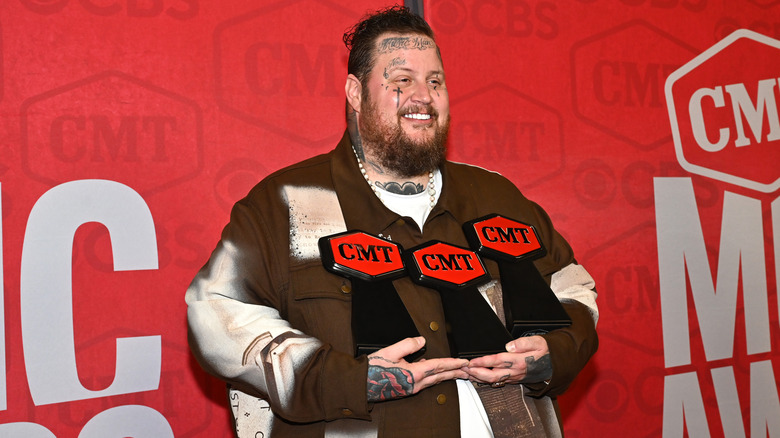The Tragedy Of Jelly Roll Explained
It's a bit overdone and a bit cliche to suggest that someone's life story is inspirational, but if there's any word that can be applied to the artist born as Jason DeFord and raised in a little, hardscrabble town in Tennessee called Antioch, it's that one. When the CMT Music Awards recognized him with a nomination in the best new music category, it was sort of odd. New to country, yes. New to music, no — he had long credited music with giving his life a direction.
He explained in a 2023 interview with The Guardian that he saw his music as a way to salvage something from what had been a troubled, grueling life of struggle, hardship, and attending the funerals of loved ones. As Jelly Roll, DeFord might be enjoying massive success, but here's the thing: He's not so far removed from his roots that he's forgotten what the struggle is like. He remembers, and it was a time when music was the farthest thing from his mind. "I love when artists are like, 'I dreamed about this since I was five.' It's like, nah, I didn't. I didn't think I was gonna make it out of being incarcerated most of my life."
Today, Jelly Roll is listening to stories, crying with those who are still struggling, and reassuring them that it can get better. And his story? There's been a dark side to country music as far back as the 1960s, and his story is one of the darkest.
The following article includes allegations and descriptions of addiction and mental health issues..
He's been candid about growing up in extreme poverty
Jason DeFord has been called Jelly Roll for about as long as he can remember: The name came when he was young, raised on the streets of Antioch, Tennessee. It's just a stone's throw from Nashville, but Jelly has been pretty candid about the fact that as far as everyday life went, the two couldn't be farther apart. In an interview with GQ, he explained, "I don't think I knew anybody with a real job. ... I just remember everybody doing drugs. I was in my 20s before I realized that having a drug addict in your family wasn't normal."
While Jelly has been incredibly candid when it comes to taking ownership of past mistakes, he says that he's also had to struggle with ideas of a toxic environment, blame, and responsibility. He told Billboard that one of his favorite movies was Disney's less-than-authentic film "Cool Runnings" for a heartbreaking reason: "'Cool Runnings' made me understand that sometimes you can do everything right and the sled still breaks. I needed that for the s**t I went through in life."
Hindsight hasn't been easy, and when he hit it big and had money to spend, he decided to buy his childhood home. The current owner refused his offer, and on the Flagrant podcast (via American Songwriter), he said it was only then that he realized it wasn't the nice home of his memories, but a "shack." What would he do with it? "Go in there and cry, I guess."
When his parents divorced, his life took on a heavy weight
While countless people have stories of a childhood made more complicated by divorce, Jelly Roll's story takes on some added weight because of other circumstances. His mother and father split when he was 13, and although he was barely a teenager himself and the youngest of his half-siblings, he told Billboard that he suddenly found himself taking on the role of provider and caregiver as he remained with his mother.
Jelly has — perhaps unsurprisingly and respectfully, given that he hasn't spoken much about his mother publicly — credited his mother with instilling a love of music in him, but he's also said that she had her own struggles with substance abuse and mental health ... without giving too many details. With his father out of the picture in many ways, Jelly said that he felt he was the one who needed to step up and both care for his mother and provide for the family.
"I felt this need to take care of my mother back then," he said. "... When he left, I was like, 'Somebody's got to do what he was doing, at least trying to figure out some money," he explained. That meant dealing drugs, while continuing to hand out his mixtapes to his customers, then growing up to wonder if his life would have been different if he hadn't taken on that burden.
He felt he had no choice but to end up on the wrong side of the law
Jelly Roll's father sold meat and had a side hustle as a bookie, and growing up in that environment, he saw few choices for his own future. He told Billboard, "As f****d up as this may sound, there were drug dealers and drug users. I wanted to be the guy getting money, not the guy losing it."
It was that mentality that pushed him into selling cocaine, and would later tell GQ, "It was scratching and clawing by, and sadly, scratching and clawing by was better than everybody else. I don't remember nobody with real money." It was that mentality, too, that led him down a perhaps inevitable road that led to teenage years in and out of juvenile detention facilities and jails. In 2023, Jelly took CBS Sunday Mornings on a tour of one of the facilities he had been incarcerated in, and broke down in tears as they visited his old cell.
"There was a time in my life where I truly thought that this was it," he explained. His time in and out of prison started when he was 14 years old, stemmed from mostly drug- and robbery-related charges, and when he continued to explain the mindset of his teenage self, he said that it was simply what he saw happening all around him. He believed that it was just the way it was done, and the future that he was destined for.
His campaign for judicial reform comes from a personal place
Jelly Roll was 15 years old when he participated in an armed robbery, and he doesn't make excuses for what he did. But although he says that yes, it was a terrible, awful thing to do that he still regrets decades later, he also knew that there was plenty that was fundamentally wrong with the way the court system treated him.
Even though he was 15 — an age where he was still years away from even being able to buy a beer — he was charged and convicted as an adult. The results have continued to be catastrophic, and even as Jelly has dedicated his life to helping at-risk kids get off the path that he knew all too well, his felony charge means that he can't do much volunteer work. He can't vote, he isn't eligible to buy life insurance, and has since become a vocal proponent of helping kids instead of punishing them.
He told People that by the time he was convicted and sentenced, he'd already been in and out of jail. That sentence was something different: "I just realized that was the most impactful thing that ever happened in my life, and the darkest moments of my life were still being that 15-year-old scared kid, spending Thanksgiving away from his family." In 2022, he spent Thanksgiving with a group of Nashville kids, and promised that he was going to be there to help them ... because no one had helped him.
His push for anti-fentanyl legislation came from heartfelt grief
In 2024, Congress welcomed a speaker both likely and unlikely — unlikely, because the man identified as "Jason 'Jelly Roll' DeFord" was a convicted felon and former drug dealer, and likely for those exact same reasons. Jelly gave an impassioned speech about the dangers of fentanyl, and he knew firsthand what the stakes were. He shared that he had attended somewhere around 30 funerals: "I could sit here and cry for days about the caskets I've carried of people I love dearly, deeply in my soul. Good people, not just drug addicts. Uncles, friends, cousins, normal people."
Jelly added that he had to come to terms with the fact that he had played a vital role in the drama that was addiction. "I am here now, standing as a man that wants to be a part of the solution." He's also been candid in the impacts that's had, saying (via The Guardian) that there were plenty of times that he found himself face-to-face with survivor's guilt. "It just hurts. The guilt you feel creates a spiral of shame."
When Jelly found himself heading to the 2023 CMT Awards, it should have been an unconditionally amazing feeling. It wasn't: Even as he was prepping for the telecast, celebrations were overshadowed by his friend's recent overdose and the knowledge that he was missing the funeral. (Click here to learn more about why the neighboring state of Kentucky is leading the way in fentanyl-related deaths.)
His name has a sad story behind it
According to what he said on The Bobby Bones Show (via American Songwriter), he was actually given the name Jelly Roll by his mother and a high school classmate. While he lightheartedly said, "Been fat my whole life. I spent the next 30 years trying to grow into the name, I think I've done it," he's also spoken about how he's struggled with weight management and how it's impacted his mental health.
When talking about his childhood, he's said that he remembered always being bullied for his weight. In 2019, he posted a video on Facebook, asking for recommendations for a nutritionist and personal trainer, writing, "Obesity is something I've truly dealt with my entire life. ... I've spent most of my life sad and depressed and I can say 90% of the reason is because of my obesity."
In an Instagram post, Jelly also spoke about the connection between his diagnosis of manic depression and his fluctuating weight, saying he had long struggled with a pattern of crash dieting and weight gain, feelings of hopelessness, embarrassment, and depression. He came face-to-face with that when he started to break into mainstream music, telling the Los Angeles Times, "Somebody told me I was too fat to be relatable. They said it a little nicer. Not much — I mean, it's hard to say that nice." (He isn't the only Jelly Roll to make his mark on music: There's also a jazz legend that went by the same nickname.)
Most of his tattoos have tragic stories behind them, and he hates most of them
Done right, tattoos can be a breathtakingly personal display of artistry. Done wrong, and there's a good chance they might lead to not only regret, but an up close and personal experience with the painful science of tattoo removal. For someone like Jelly Roll — who's literally covered in tattoos — that might just not be an easy option. In an interview with GQ, Jelly Roll gave an honest look at his tattoos — and said that he hated most of them.
"I regret 98% of these tattoos. 97%. Almost all of them," he said. "Like, core philosophies that I rooted my life in when I was 17, and now I'm 40, and I'm like, 'What the f*** was I thinking?'" While some — like the smoking baby on his arm — he just unconditionally doesn't like, there are some that came from a deeply personal place. His very first tattoo he got when he was just 14 years old, and it's a cross in the memory of a beloved neighborhood icon who passed away after being diagnosed with AIDS.
He's done cover-ups on some of his biggest regrets, including a neck tattoo that read, "Surviving the sruggle," instead of "Surviving the struggle." He did say that the cross on his cheek is his most meaningful, and went on to give advice: Don't compromise, or you'll end up with a tattoo of Jesus that looks a lot like Elvis.
He's seen his daughter face addiction and drug abuse
When Jason "Jelly Roll" DeFord appeared before Congress to lobby for them to take the fentanyl crisis seriously, he explained: "My father always told me, what doesn't get you in the wash will get you in the rinse. Now I have a 15-year-old daughter whose mother is a drug addict. Every day I get to look in the eyes of a victim in my household of the effects of drugs."
He went on to say that he was haunted by the knowledge that there was a very real possibility that he would someday have to tell his daughter that her mother had lost her life to addiction. In a 2020 Facebook post, he revealed that while he and his wife had full custody of daughter Bailee, they were also supporting Bailee's mother in her journey through rehab and sobriety.
When Jelly's wife, BunnieXO, interviewed Bailee on her podcast, she was honest about how — in 2020 — she had started trying to rebuild a relationship with her mother. When they spent time together over the summer, though, she went from thinking it was cool that her mother let her experiment with alcohol and marijuana, to being upset that she then pressured her to try harder drugs. "I ended up trying it because she's ... manipulative," Bailee said (via American Songwriter). Fortunately, she told Jelly and Bunnie, and they were able to get her the help she needed.
The death of his father hit him very, very hard
Even though Jelly Roll's parents divorced when he was 13 and he lived with his mother, he remained close to his father. He's shared some wonderful family photos on social media that make it obvious just how much love there was between them, and when COVID hit, the grief of losing his father after a diagnosis of leukemia was still fresh.
Horace DeFord died on March 20, 2019, and on the one-year anniversary of his death, Jelly posted a photo to Instagram. He wrote, "I still pick up the phone and dial his old number — I miss him every day, today's a rough one ... hug your dad for me today if you can — I sure wish I could hug mine." Jelly has been candid about the depths that grief can take a person to, posting a video on Facebook in which he visited the site of an old hospice facility for a film shoot. It was a week since his father's death, and a week since he'd asked him to send him a sign that everything was alright. He said that he saw a literal sign — his father's name on one of the doors — and knew that it was his father, reaching out.
He's continued to post tributes to his father on significant occasions, like the day that would have been his 77th birthday. Jelly wrote on Facebook, "He was my best friend, he taught me how to live and later in life he taught me how to die."
Success brought new problems: Imposter syndrome
From making his own mixtapes to becoming a YouTube sensation with no big label behind him, Jelly Roll is proof that with talent and determination, the sky's the limit. In an interview with the Los Angeles Times, he shared what it was that made him want to go even bigger: He was playing in front of a few hundred people in a show, seeing the impact his songs had, and he wanted the chance to touch even more lives. It's safe to say that he got it, but it hasn't gone to his head. In comparing himself to a few other singer-songwriters described as "where-they-are-in-their-life-right-now songwriters," he said, "We're not the best singers, you know what I mean? ... But I think it's filling a necessary void."
It's nice to think that a lifetime of struggle has resulted in the unconditional enjoyment of success, but that's not the case with Jelly. In an interview with The Guardian, he admitted that he had suffered from imposter syndrome for a long time, and that it kept him from perhaps fully acknowledging the fact that he had earned — and deserved — the accolades.
"I see myself as a broken man that's trying to put the pieces of the puzzle back together. I looked at the whole experience as a cry for help. And it was heard. The music represents so many people that haven't felt heard."
If you or anyone you know needs help with addiction or mental health issues, contact the relevant resources below:
-
The Substance Abuse and Mental Health Services Administration website or contact SAMHSA's National Helpline at 1-800-662-HELP (4357).
-
The Crisis Text Line by texting HOME to 741741, call the National Alliance on Mental Illness helpline at 1-800-950-NAMI (6264), or visit the National Institute of Mental Health website.










